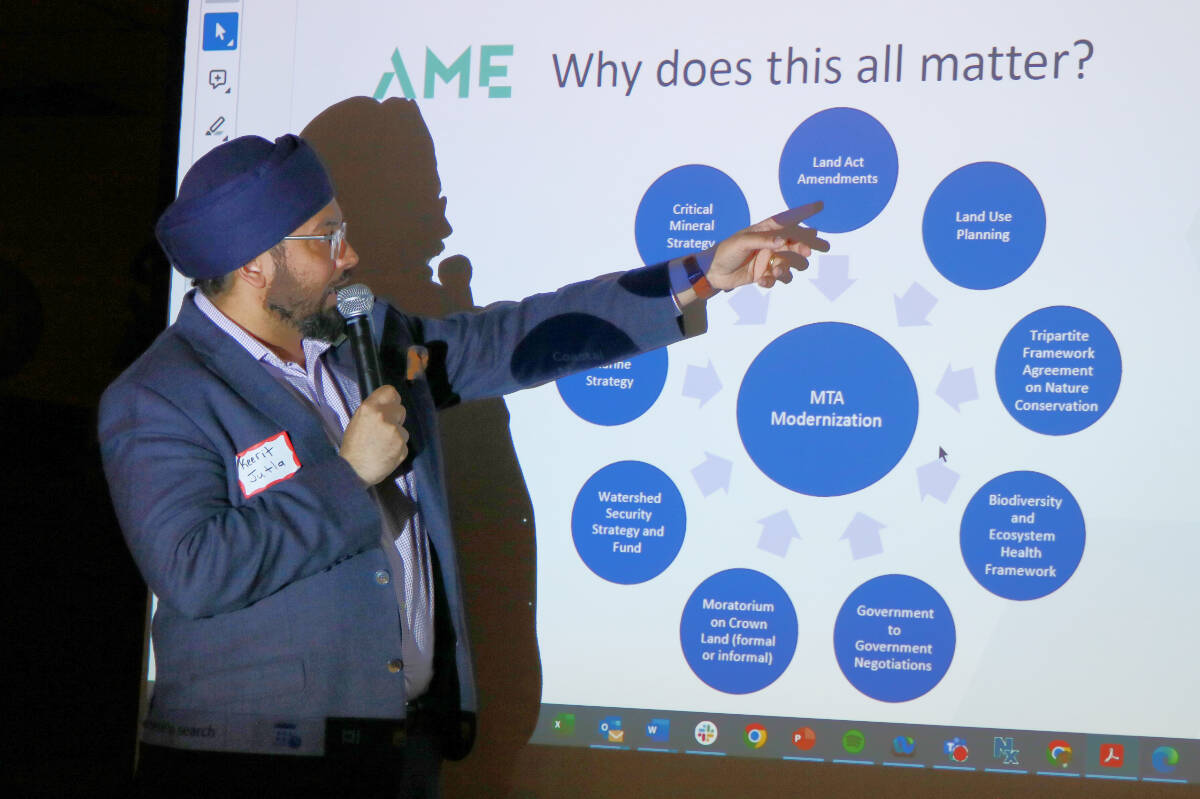A review of B.C. mineral claims legislation continues with industry representatives wondering why they haven’t been called to the table.
Keerit Jutla, chief executive officer of Association for Mineral Exploration in BC, said his group hasn’t been invited into a technical working group created by the province to inform changes to the Mineral Tenure Act. That group consists of the First Nations Leadership Council, First Nations Energy and Mining Council and government.
The reform started on Sept. 26, 2023, after the BC Supreme Court gave the province 18 months to update the act, following a successful constitutional challenge by two First Nations.
BC Energy Minister Josie Osborne said in early March the province is working on a “shared vision for mining reform that will uphold and respect First Nations rights and title and is aligned with the UN Declaration, and build a responsible and healthy mining sector in British Columbia.”
Jutla said his organization wants a seat at the table.
“We want industry to play a more significant role,” he said, adding that the mineral exploration business is committed to the implementation of the Declaration on the Rights of Indigenous Peoples Act.
RELATED: Indigenous mineral interests protected as province modernizes mineral tenure act
Osborne told Black Press Media on Wednesday (March 13) that while the association won’t be part of the technical group, it will participate in the reform.
“We have a number of different venues for industry to participate,” she said. “I myself will have direct conversations with them. My staff will directly engage them. They will participate in webinars and in meetings and in other forms.”
The public will be able to offer their feedback online in the coming days.
Jutla said his organization would like to see a staking system that is competitive, transparent, protects the intellectual property of explorers and attracts investment.
Looming in the background is government’s recent decision to pause amendments to the Land Act, which governs access to 95 per cent of the provincial land base. B.C.’s Minister of Water, Land and Resource Stewardship Nathan Cullen announced last month the province won’t bring forward amendments to the act, citing the need for more consultation.
RELATED: B.C. presses pause on Indigenous-related changes to the Land Act
“One of the things we communicated to government very early and very often is that is the totality of all government policy and legislation must be analyzed together to develop a regulatory regime that works for mineral exploration, mining and the natural resource economy,” Jutla said.
“In order to have a competitive, certain exploration process, we need certainty of the land base.”
Mineral exploration is a precursor to any mining operation. Both the industry and province have been touting B.C.’s supply of critical minerals as a strategic asset in the green transformation of the provincial economy, as well as export opportunities.
The origin of the Mineral Tenure Act reform dates back to a court case launched in 2021. Gitxaala Nation and Ehattesaht First Nation challenged the province’s online mineral tenure registry, which automatically granted mineral rights territory without consultation.
The case marked the “first judicial consideration of the legal effect” of the Declaration on the Rights of Indigenous Peoples Act seeking to bring provincial law into alignment with UNDRIP.
Gitxaała Chief Councillor Linda Innes said at the time of the ruling that the nation “knew all along” that the province was duty-bound to consult Indigenous Peoples about mineral claims on their territories.
“The provincial government must now act quickly to eliminate its unjust practice of selling off our rights without our consultation or consent,” she said.

